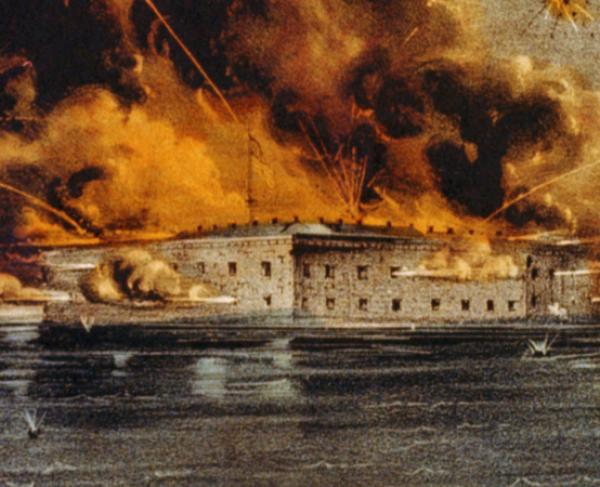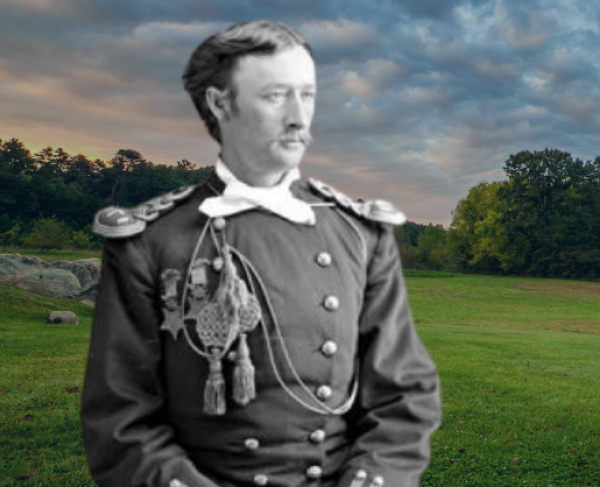Book: Freedom National

The Civil War Trust recently had a chance to sit down with historian James Oakes and discuss his new book, Freedom National: The Destruction of Slavery in the United States. This book describes the complex steps taken by the Lincoln administration to undermine and ultimately abolish slavery during the Civil War years.
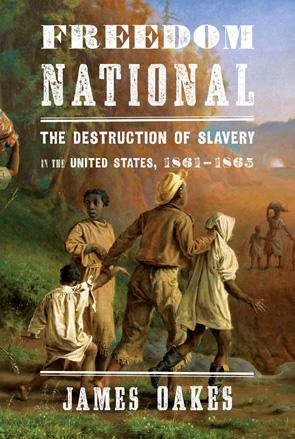
Civil War Trust: Some modern undercurrents have attempted to remove slavery as a primary cause of the American Civil War. Where do you come down on the cause or causes of the war?
James Oakes: Most, but not all, historians still agree with Abraham Lincoln that slavery was "somehow" the cause of the war. Most, but not all, would also agree that the slave states seceded to protect slavery. But over the past few decades a substantial number of historians have come to deny that the Civil War had any substantial antislavery origins. This has had major consequences, not the least of which is the commonplace that secession was “hysterical.” It also implies that the conflict was "reconcilable." I think the antislavery threat was real and that secession was a perfectly understandable reaction to the victory of the Republicans in 1860. In retrospect secession turned out to be a spectacular miscalculation, but it was not to my mind hysterical. The South seceded from the Union because an antislavery majority in the North had elected an antislavery President.
Were Lincoln and the Republican Party committed to eliminating slavery in 1861?
JO: Republicans came into the war with two broad scenarios for a federal assault on slavery. The first was a peacetime program familiar to all abolitionists that was designed to bring about what Lincoln would later call the "ultimate extinction" of slavery. They would, of course, ban slavery from all the western territories, but that was only one part of the larger project. They would prohibit federal enforcement of the fugitive slave clause of the Constitution, abolish slavery in Washington, D.C., withdraw federal protection of slavery on the high seas, and deny admission to any new slave states. With this package of policies, abolitionists believed, the federal government would construct a “cordon of freedom” around the slave states. They assumed that because slavery was intrinsically weak the "cordon of freedom" would ultimately strangle slavery to death, forcing the slave states themselves to abolish slavery on their own. Abolition would begin in the Border States, where slavery was weakest. As more and more free states joined the Union, as more and more slave states abandoned the institution, slavery would die.
It’s important to understand that antislavery politicians believed this was a peacetime policy, that it would not violate the Constitution’s ban on direct federal “interference” with slavery in the states where it already existed. Yet it was the reason the cotton states seceded.
Secession in turn led Republicans to threaten a second antislavery policy: immediate, uncompensated military emancipation in the disloyal states, justified under the war powers of the Constitution.
So these were the two broad scenarios Republicans put on the table during the secession crisis. In effect they offered the slave states and alternative. States that remained loyal would be offered a package of incentives designed to encourage the peaceful, gradual abolition of slavery. But secession meant war, and war meant immediate, uncompensated military emancipation.
You point out in Freedom National that the Republicans built an anti-slavery strategy around slaves actively seeking their freedom. How so?
JO: Military emancipation policy evolved over the course of the war, but it was always based on the assumption that the slaves hated slavery and would take advantage of the war by claiming their freedom.
The first emancipation policy, spelled out in the War Department’s instructions of August 8, 1861, explicitly prohibited Union soldiers from enticing slaves away from peacefully operating farms and plantations. Instead, it freed only slaves who came within Union lines. This applied to two different groups—slaves who escaped to Union forts and camps from the disloyal states, and slaves who refused to leave with their owners when the Union army or navy occupied any territory in the rebellious states. In other words, the slaves themselves had to choose loyalty to the Union over loyalty to their masters in order to be emancipated. Republicans predicted that this would happen if war broke out, and felt vindicated when slaves began running to Union lines from the earliest weeks of the war.

The Emancipation Proclamation moved military emancipation in a much more aggressive direction. It lifted the ban on enticement, and it openly invited slaves to escape to Union lines to secure their freedom. So once again federal policy depended on the willingness of the slaves to secure their own freedom.
With the enlistment of black men into the Union army, federal policymakers openly proclaimed their dependence on slaves who were willing to risk their lives to secure their freedom.
In short, at every step along the way, Republican policymakers and slaves worked together, in tandem, to undermine slavery. Federal officials understood this, and freely said so. Lincoln himself eventually concluded that black troops were “indispensable” to Union victory, and thus to the successful destruction of slavery. The slaves understood it as well. They knew that Lincoln’s election had major implications for their own freedom and when the war began they ran to Union lines, not Confederate lines, on the reasonable assumption that the two armies would greet escaping slaves in very different ways. Both sides, North and South, would be “forced” to respond to escaping slaves. But their responses were very different, and the slaves realized this.
Tell us more about Benjamin Butler’s role in the anti-slavery movement. He seems to be continually at the forefront of interesting anti-slavery actions throughout the war.
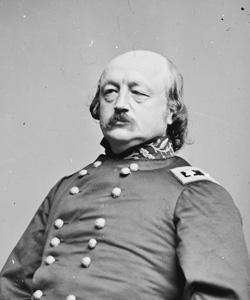
JO: Most scholars don’t like Benjamin Butler, but I confess that I have a soft spot for him. He was a lousy general, of course, but a shrewd politician. Butler’s threats to suppress "insurrection" in Maryland at the outset of the war were carefully worded and, unlike McClellan’s, deliberately ambiguous. Butler’s warnings were not explicitly directed at the suppression of slave insurrection, and indeed in Baltimore the insurrection that had to be suppressed at the outset was secessionist.
Butler’s behavior at Fortress Monroe, and his letters explaining his behavior, strike me as similarly shrewd. He was clearly-well versed in the subtleties of antislavery constitutionalism and was continually employing familiar abolitionist arguments to push federal policymakers toward more aggressive antislavery policies. In a sense, Butler made it easy for the War Department. Should I send these escaping slaves back to work on Confederate fortifications? he would ask. He was inviting the administration to say "No, of course not," which is precisely what the cabinet said. But if they come with their wives and children, you wouldn’t want me to send them back, would you? "Of course not," the Lincoln administration replied. This was May of 1861, only weeks after the war started.
So Butler retained the slaves as "contraband of war," and pretty soon he was pressing his superiors even further. What’s the status of these "contrabands?" Butler asked in late July, 1861. We know what the used to be under the laws of Virginia: They were "property." But we don’t want them as "property" and won’t hold them as such. If you ask me, Butler wrote, they are no longer "property" but are instead "men, women, and children." But of course, he added, that’s a policy decision for you folks in Washington to decide, not for me—a mere general. It really is delightful to watch his sharp intelligence at work.
In Louisiana in early 1862 Butler faced a different and much larger problem. Unlike at Fortress Monroe and the Sea Islands, many of the Louisiana planters did not run away when the Union forces arrived and many of them claimed to have been loyal. Did they fit the legal definition of slaves who came “within” Union lines? And there were practical differences as well. At Fortress Monroe, Butler had to accommodate hundreds of contrabands; in Louisiana there were tens of thousands. So there were both legal and logistical questions that had to be addressed. Once again Butler forced the issue in letters that put the issue clearly to his superiors: Was the Union Army expected to care for and emancipate tens of thousands of slaves on abandoned plantations? Lincoln’s answer was, once again, "Yes, you are expected to free them and care for them."
By late 1862 Butler was sending enthusiastic letters back to Lincoln, boasting of the success he was already achieving on plantations where slaves had been freed and were now working as wage laborers.
What I admire most about Butler, then, is the combination of smarts—he was well-versed in the legal logic of antislavery constitutionalism—political savvy, and tough-mindedness. More than any other Union general, Butler translated the "problem" of slaves coming into Union lines into policy questions for his superiors in Washington.
"Confiscation" vs. "Emancipation" – How did these terms factor into the Second Confiscation Act?
JO: Both the first and second confiscation acts dealt with two distinct issues—the confiscation of rebel property and the emancipation of rebel slaves. It was axiomatic among opponents of slavery that the slaves were recognized as "property" only under state or "municipal" law, but that the Constitution recognized slaves only as "persons." For Republicans like Lincoln this meant that there was no such thing as a constitutional right of property in slaves. The most masters could claim under the Constitution, Republicans believed, was a property right in the services of the slaves rather than property in the physical person of the slave.
The result, legally, was that the two confiscation acts treated slave "property" differently from the way they treated real property. All property could be confiscated under the laws of war, but many Republicans believed that the Constitution did not allow the real estate of rebels to be confiscated beyond the lifetime of those convicted of treason. This was the famous ban on attainder.
But the ban did not apply to slaves because under the Constitution slaves were not property but "persons held in service." Thus under the terms of the two confiscation acts masters "forfeited" the services of their slaves and had no further legal claim to them. The slaves whose services were "confiscated" by the congressional statute were then emancipated by the President, acting in his capacity as commander in chief. That’s the way "military emancipation" worked. At least legally.

With slavery still a Constitutional right, how did the Republican party deal with "loyal" slaveholders, especially those in Border States?
JO: Republicans never believed that slavery was a "constitutional right" in the sense that slaveholders meant—that is, a right of property. Instead, they believed that under the principles of federalism the Constitution required the federal government to recognize the existence of slavery in the states that created it. States that seceded from the Union lost that constitutional protection. But four slave states—Delaware, Maryland, Kentucky, and Missouri—known as the Border States, remained loyal to the Union and therefore claimed that slavery was still protected by the Constitution from federal interference.
This made the Border States an especially tricky problem for Republican lawmakers. Like most of slavery’s opponents, Republicans believed that slavery was weak everywhere but weakest of all in the Border States. They came into the war expecting slavery to crumble first in those areas—in response to federal pressure as Republicans constructed their "cordon of freedom" around the South.
Its commonly said that Lincoln’s concern with the loyalty of the Border States impeded the progress of emancipation, but I think something closer to the opposite was the case. If all Republicans cared about was retaining the loyalty of the Border States, that would have been easy. But that’s not all they wanted. They wanted to hold those states in the Union while at the same time pressuring then to abolish slavery on their own. Contrary to the prevailing orthodoxy, wartime allowed Republicans to put added pressure on the Border States and to construct the "cordon" much more rapidly than it could have done in peacetime.
Contrary to Republican expectations, the Border States responded to federal pressure against slavery by ramping up their resistance rather than quickly surrendering to abolition. By 1862 Lincoln and the Republicans in Congress were fed up with the Border States and began warning that military emancipation would spread from the lower South northward into the upper South. By 1863 the Union army was actively impressing slaves from loyal masters in the Border States and guaranteeing the freedom not only of Border State enlistees but also the freedom of their families.
Eventually the slaveholders in Maryland and Missouri were routed, and both states abolished slavery at the end of the war. But Kentucky and Delaware resisted to the bitter end. By the last year of the war Union and state forces were virtually at war with one another in Kentucky. Only the thirteenth amendment put an end to slavery in those states.
In short the history of abolition in the "loyal" states is distinct from, though closely related to, the history of military emancipation in the "disloyal" states.
The Preliminary Emancipation Proclamation is one of the great steps on the anti-slavery crusade. What triggered Lincoln to author this document in 1862?
JO: Both the first and second confiscation acts required presidential proclamations to be fully implemented. One of the disputes among Republicans during the drafting of the second confiscation was whether the law should require the president to proclaim emancipation within a specified period of time, or whether it should merely empower him to do so. To preserve the "military" character of emancipation—which is the only kind of emancipation the Constitution allowed—Republicans ended up empowering the president to issue the proclamation by virtue of his authority as commander-in-chief. In this sense both the "preliminary" and final proclamations were "triggered" by the Second Confiscation Act.
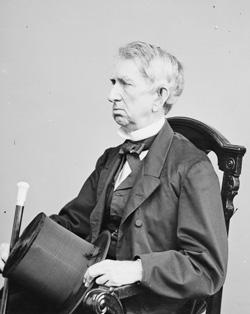
Everyone assumed that Lincoln would issue the proclamation shortly after he signed the bill into law on July 17, 1862. Even Lincoln assumed it. He went to the next week’s cabinet meeting with a first draft of the emancipation proclamation. But the Union army had just failed to capture Richmond during the peninsula campaign and Secretary of State William Seward urged Lincoln to withhold the proclamation until the army had scored a significant military victory. That way, Seward argued, the proclamation would be received as an act of triumph rather than an act of desperation.
The "triumph" came at Antietam, a few months later. That was the victory Lincoln was waiting for, and a few days after that he issued the so-called "preliminary proclamation."
It may be a mistake to focus too much on Antietam. Lincoln was going to issue the proclamation at some point, surely before Congress came back in December. Otherwise his fellow Republicans would have been up in arms. They all expected a proclamation based on the law they’d passed in July. Also, the date for a final proclamation in the July and September drafts was identical: Both gave the Confederates until January 1, 1863, to abandon their rebellion or face universal emancipation. In a sense, the wait until Antietam changed nothing.
When issued, the Emancipation Proclamation was positioned as a "military necessity." How much of this is truth and how much of this is cover for a controversial policy?
JO: It was true and it wasn’t a cover at all, though that’s what Democrats charged. There was no "military necessity" for emancipation, they claimed, and even if there was there was no such thing as "military emancipation" under the Constitution. But opponents of slavery, especially antislavery radicals, were attracted to the idea of emancipation as a military necessity ever since John Quincy Adams had formulated the doctrine during the "gag rule" debates. By 1860 "military emancipation" was widely, and correctly, understood to be part of a "radical" antislavery agenda. As far as southern leaders and northern Democrats were concerned, the idea of "military emancipation" was controversial. But among Republicans it was commonplace.
You point out that the states exempted from the Emancipation Proclamation produced the most USCT recruits. Why was that?
JO: In part it was simply a question of where the Union army was located. For obvious reasons the army attracted the most recruits from the places they occupied. They occupied the areas exempted from the proclamation—that’s why those areas were exempted. Hence states like Tennessee and Kentucky got the largest numbers of black recruits.
In part it was a function of deliberate Union policy. Lincoln’s Secretary of War, Edwin Stanton, insisted that under the conscription acts passed by Congress the army could “draft” slaves into the Union army, even in loyal slave states, even of loyal owners. So the army set up large recruitment centers in states like Maryland and Kentucky—loyal slave states technically untouched by the Emancipation Proclamation. Partly the Union simply needed the manpower, but it was also part of the increasingly aggressive effort to force the loyal states to abolish slavery on their own.
Finally, slaves themselves made the choice. The only sure way for young enslaved men in the loyal slave states to secure their freedom, along with the freedom of their families, was by enlisting in the Union army. Enlistment guaranteed emancipation.
For all these reasons the states occupied by the Union army, especially technically "loyal" states like Tennessee and Kentucky, produced the largest numbers of slave enlistments.
What was the Confederate strategy to counter the Emancipation Proclamation after its release?
JO: There was no single Confederate strategy for counter-revolution, but that the counter-revolution was well under way in the second half of the war seems indisputable. From individual masters who dragged their slaves off into the woods to avoid the approaching Union Army, all the way up the lines of authority—through local "home guards," police and sheriffs, state officials, the Confederate Army, the Confederate Congress, and Jefferson Davis himself—all of them sprang to action to preserve slavery from the emancipation policies of the invading Yankees.
It’s hard to imagine Confederates acting otherwise. They had left the Union to defend slavery. They were hardly going to lay down and let it happen without putting up a fight. So local patrols were authorized to shoot escaped slaves; southern states made it legal to "shoot to kill" any slave thought to be running to Union lines. Confederate generals forced the removal of large numbers of slaves off their plantations so they could be put beyond the reach of invading Union armies. And of course, no Confederate official was going to recognize the legitimacy of any Union decreed "emancipation." In Davis’s mind, there was no such thing as an "emancipated" slave, there were only escaped slaves. Why would he have thought otherwise? So naturally, when escaped slave who had joined the Union army were captured in battle, Davis ordered that they be treated like fugitives and returned to their owners.
By the last years of the war the "counter-revolution of property" was well underway in the Confederacy. It was violent and bloody, which is in the nature of counter-revolutions. I barely scratch the surface of this important subject, but other scholars—notably Thavolia Glymph—are working on it, and their finding will add a significant chapter to the history of emancipation.
Tell us more about why Lincoln was eager to get the 13th Amendment passed before the end of the Civil War.
JO: In a sense there was no real need to rush in January of 1865. Lincoln and the Republicans had won big in the 1864 elections, enough to secure the 2/3 vote in the House that Democrats had been able to withhold in the previous session. Lincoln pointed this out in his December 1864 message to Congress: It’s going to pass, so why not pass it now.

Then why did his administration go to such lengths to get it passed in January, 1865?
Republicans had always justified their antislavery policies as war measures. They always believed that slavery had caused the war, they came to appreciate that slavery was stronger than they first assumed, and they therefore argued that the destruction of slavery was necessary to suppress the rebellion. Democrats charged that the Republicans had always used "military necessity" as an excuse to mask their fanatical determination to destroy slavery. The closer they came to the end of the war, the easier it was for Democrats to repeat the charge.
So if I had to guess, I’d say that Lincoln "rushed" to get the amendment passed in January 1865 because he feared that if the war ended before abolition was secure the Democrats’ charge would seem to be validated. If Republicans continued to press for abolition once peace was restored, they would lose their most politically potent justification for the amendment.
It’s always been too easy to think of the destruction of slavery as inevitable. There are many ways of making the argument: Slavery was so backward, so inefficient, that it would have died even without a war. Or: So many slaves were running to Union lines that nothing could have stopped the revolution from continuing until slavery was destroyed. Or: Once Lincoln issued the Emancipation Proclamation slavery was doomed. But I’m now convinced that slavery was too big to be destroyed by the war, that it had specific “strengths” that allowed it to survive the rigors of war, that only by driving a constitutional stake through its heart could slavery be fully destroyed, and that nobody could be reasonably sure that would happen until Lincoln and the Republicans won the elections in November of 1864. There was nothing inevitable about the destruction of slavery in the United States.
Buy the Book: "Freedom National" is available from our Civil War Trust-Amazon Bookstore

James Oakes is an American historian, and is a Distinguished Professor of History and Graduate School Humanities Professor at the Graduate Center of the City University of New York where he teaches history courses on the Civil War and Reconstruction, Slavery, the Old South, Abolitionism and U.S and World History.

